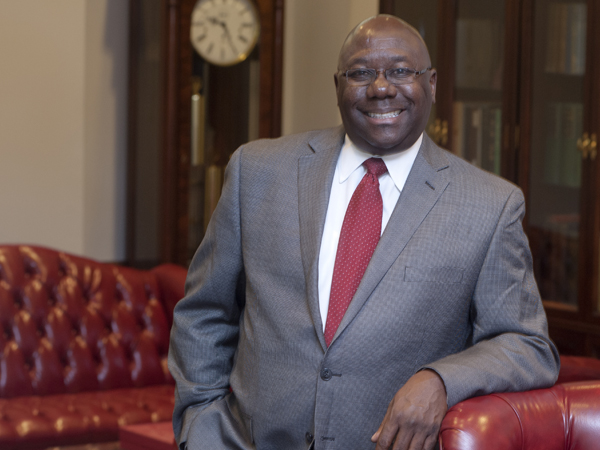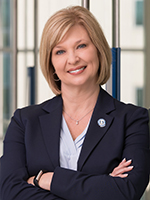Brunson’s newest role: Ensuring state’s physicians keep patients safe

As senior advisor for external affairs at the University of Mississippi Medical Center, Dr. Claude Brunson forges partnerships in the community and helps find solutions to problems ranging from out-of-control opioid prescribing to flaws in the state’s mental health system.
In 2014, he was sworn in as president of the Mississippi State Medical Association, becoming the first African-American to lead the organization of nearly 5,000 physicians and medical students. On July 1, he assumed the responsibilities that come with one of the state’s top medical leadership posts when he became president of the Mississippi State Board of Medical Licensure.
That newest hat is “almost an umbrella that incorporates all the other things I do,” said Brunson, who is also a professor of anesthesiology. “I’ve always said that the Medical Center should have a seat at the table at all of these important agencies that can have an impact on the Medical Center.”

“Dr. Brunson nurtures so many key external relationships that are important to advancing UMMC’s missions,” said Dr. LouAnn Woodward, vice chancellor for health affairs and dean of the School of Medicine. “His many years of experience both here and on the Medical Licensure Board make him well suited for this role.”
As president, Brunson leads the Board of Medical Licensure in making sure that Mississippi residents receive safe treatment from physicians and several other groups of health care professionals. That vigilance includes suspending, withdrawing or placing restrictions on the licenses of physicians who violate the state’s medical practice act or who are dangerous to public health and safety.
Dr. Michelle Owens, UMMC professor of obstetrics and gynecology, also is a member of the 16-member board.
“We license physicians, physician assistants, radiology assistants, podiatrists and acupuncturists. Our main job is to assess, review and license qualified practitioners to practice medicine in the state,” Brunson said. “Our prime directive is to protect the public and to make sure we have safe practitioners who are qualified for Mississippians to go to for health care.”
He said that’s different than the role of the Mississippi Medical Association. “It’s a trade organization that represents physicians in the state, and that advocates for policies and laws that make the practice of medicine the best for physicians and their responsibility for taking care of patients.”
As part of its work, the Board of Medical Licensure is contemplating an overhaul of regulations to physician prescribing of opioid drugs in Mississippi. The policy would discourage physicians from prescribing more than a three-day supply, but would allow a 10-day supply with an additional 10 days if clinically necessary, but with a new prescription and documentation of why it’s necessary.
The proposed changes also would include a requirement that providers run the name of each patient receiving an opioid prescription through the state’s online prescription monitoring program to check whether the patient has already received prescriptions from other providers. That regulation would apply to patients coping with acute or chronic non-cancerous and non-terminal pain.
“One of the main things I’ve been educating on lately is the rules and regulations on opioid management in the state,” Brunson said. “I’ve been giving a lot of talks, both in the Medical Center and externally, about safe practices by physicians as they are prescribing opioids.”
Brunson, who serves on a number of national and state boards and committees, last month was recognized by the Mississippi Medical and Surgical Association as the first recipient of its Distinguished Physician Award. He spends one day a week in the operating room, and he also teaches medical students and residents aspiring to his specialty.
“When I’m in an OR and clinic setting, I get to talk to medical students and residents about the legal practice of medicine and our responsibilities and duties to our patients,” said Brunson, former chair of the Department of Anesthesiology. “Maintaining a clinical practice strengthens my ability to teach and pass on to the younger generation things that will govern their practice.”

